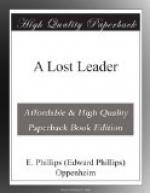“The work is of such a nature,” Mannering said, “that I could not refuse it. It may not come, but if it does I must go through with it.”
“I doubt whether you will succeed,” the doctor said. “There is nothing the matter with you except that you have been drawing on your reserve stock of strength to such an extent that you are on the verge of a collapse. The longer you stave it off the more complete it will be.”
“You are a Job’s comforter,” Mannering remarked, with a smile. “Send me some physic, and I will take things as easy as I can.”
“I’ll send you some,” the doctor answered, “but it won’t do you much good. What you want is rest and amusement.”
Mannering laughed, and showed him out. When he returned to his study Hester was there, just returned from a visit to the theatre with some friends. She threw off her wrap and looked through the letters which had come by the evening’s post.
“Did you see this from Richard Fardell?” she asked him. “Parkins is dead at last. Fardell says that he has been quite childish for the last eighteen months! Are you ill?” she broke off, suddenly.
Mannering, who was lying back in his easy-chair, white almost to the lips, roused himself with an effort. He poured out a glass of wine and drank it off.
“I’m not ill,” he said, with rather a weak smile, “but I’m a little tired.”
“Who was your visitor?” she asked.
“A doctor. I felt a little run down, so I sent for him. Of course he told me the usual story. Rest and a holiday.”
She came and sat on the arm of his chair. Every year she grew less and less like her mother. Her hair was smoothly brushed back from her forehead, and her features were distinctly intellectual. She was by far the best secretary Mannering had ever had.
“You need some one to look after you,” she said, decisively.
“It seems to me that you do that pretty well,” he answered. “I don’t want any one else.”
“You need some one with more authority than I have,” she said. “You ought to marry.”
“Marry!” he gasped.
“Yes.”
“Any particular person?”
“Of course! You know whom.”
Mannering did not reply at once. He was looking steadfastly into the fire, and the gloom in his face was unlightened.
“Hester,” he said, at last, in a very low tone, “I will tell you, if you like, a short, a very short chapter of my life. It lasted a few hours, a day or so, more or less. Yet of course it has made a difference always.”
“I should like to hear it,” she whispered.
“The two great events of my life,” he said, “came together. I was engaged to be married to the Duchess of Lenchester at the same time that I found myself forced to sever my connexion with the Liberal party. You know, of course, that the Duchess has always been a great figure in politics. She has ambitions, and her political creed is almost a part of the religion of her life. She looked upon my apostasy with horror. It came between us at the very moment when I thought that I had found in life the one great and beautiful thing.”




